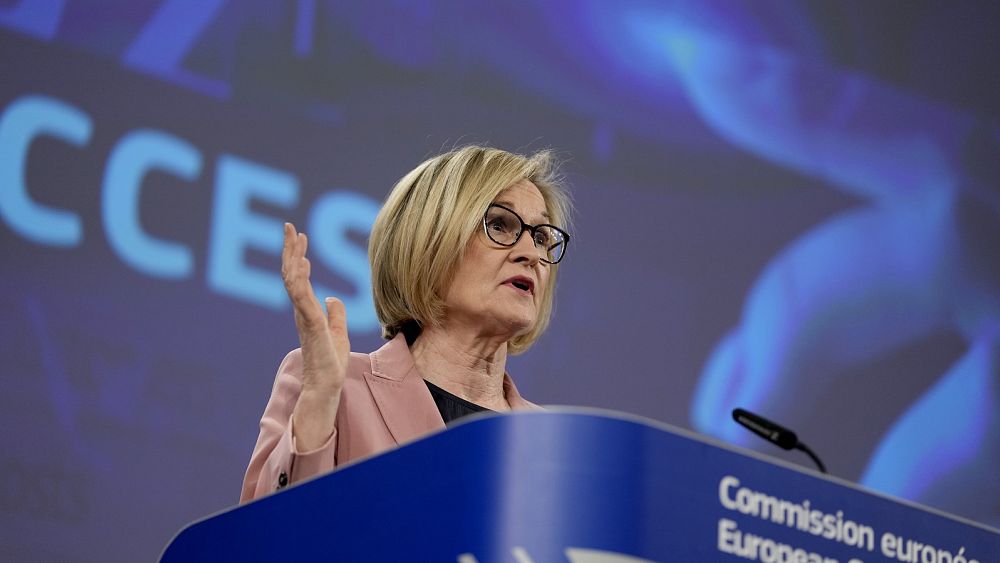World
MEPs accuse EU Commissioner of attempting to limit tax transparency

Members of the European Parliament (MEPs) grilled EU Finance Commissioner Mairead McGuinness on Thursday after they claimed a document sent by the bloc’s executive urges EU countries to weaken their tax transparency requirements.
McGuinness assured that the document, which provides EU capitals with technical guidelines on the so-called public country-by-country reporting Directive, aims to stop multinationals from benefiting from legal loopholes and in no way curbs member states’ ambition in clamping down on tax evasion.
But some MEPs believe the document is a covert attempt at limiting tax transparency.
“The guidance provided in the letter isn’t technical guidance. This guidance has political influence, and this constitutes a transgression,” said Evelyn Regner, Vice-President of the European Parliament for the Socialists and Democrats.
“The guidance clearly overshoots the mandate of the European Commission, and behind our back, the co-legislators,” she added.
Manon Aubry, an MEP for The Left said that “in the greatest secrecy, the Commission sends a note to member states asking them to apply minimum transparency rules. Who has given you this mandate?”
Two MEPs from the right-leaning EPP group came out in McGuinness’ support, defending the document as necessary to avoid legal fragmentation and warning against over-burdening corporates with transparency rules.
“It’s naive to think that if you make tax information public that then you collect more tax,” said German MEP Markus Ferber said.
“We need to strengthen cooperation between tax authorities. That’s what counts because they’re the ones that determine the tax burden and ensure companies are paying their fair share,” he added.
The tax transparency Directive entered into force in 2021 as part of the EU’s response to the 2016 Panama Papers scandal, which exposed how the super-rich benefited from secretive offshore tax regimes.
McGuinness, who voted for the Directive in 2021 when she was an MEP, said that the Commission’s intervention tackles the practice of ‘gold plating’, where governments add extra requirements and burdens when applying EU law, creating fragmentation between member states and negatively impacting the single market.
She also stated that gold plating could increase the risks of multinationals circumventing rules and structuring their business activities to take advantage of regulatory gaps.
“I also want to emphasise that informing member states of the drawbacks of gold plating does not mean prohibiting anything. Ultimately, member states can add reporting obligations as they see fit,” she said.
A group of MEPs responsible for drafting the Parliament’s report on the tax transparency Directive in 2021 addressed a letter to the Commission Wednesday asking for clarity on the intervention.
McGuinness committed to providing a written reply to their questions.
The 2021 Directive requires big companies with revenues of more than €750 million to publicly disclose where they are paying tax, and includes a clause encouraging governments to introduce measures beyond the EU requirements.
But opponents say the law does not go far enough, as companies would only have to declare the taxes they pay in EU countries and in 16 countries on the so-called ‘black’ and ‘grey’ list of fiscal havens.
Only ten member states have transposed the bill into domestic law. The deadline for doing so passing was 22 June 2023.
Interference in tax transparency rules recently came into the global spotlight globally when an allegation emerged against the OECD for lobbying the Australian government to water down its tax transparency rules.

World
Prada offers savage, instinctive menswear during Milan Fashion Week
MILAN (AP) — Miuccia Prada and her co-creative director Raf Simons described the latest Prada menswear collaboration unveiled during Milan Fashion Week on Sunday as raw and cinematic.
While the Milan Fall-Winter 2025-2026 runway was full of faux fur collars, Prada went the usual step beyond and created primitive detailing in shearling that looked almost torn from the beast and set askew on outerwear lapels, or patchworked into garments.
“Maybe, it reads as savage, primitive cavemen. I think that our aim was to make it feel warm and human and instinctive, but also kind of beautifully domestic in a way,” Simons said backstage.
A model wears a creation part of the men’s Prada Fall-Winter 2025-2026 collection, that was presented in Milan, Italy, Sunday, Jan. 19, 2025. (AP Photo/Luca Bruno)
Collection hallmarks
Cinematic references were broad and not specific to any film, director or even character type, Simons said. Western touches included scuffed cowboy boots and knitwear mimicking a wrangler’s shirt – without creating characters or caricatures.
Feminine touches flourished. Men were invited to wear jewelry, such as bracelets with mini basketballs or baseballs. Chains with amulets hung from fine knits. Fake fur-lined hoods came in florals.
The silhouette mixed skinny trousers, often in bright rock-and-roll satin, with more ample volumes like pajama tops or slightly ratty sweaters. Suits required no shirts, as the designers advocated instinctive dressing.
One look seemed to distill the collection to its boyish essence: Straight leg jeans with a knit top featuring striped detailing, worn with floral-stamped cowboy boots.
A model wears a creation part of the men’s Prada Fall-Winter 2025-2026 collection, that was presented in Milan, Italy, Sunday, Jan. 19, 2025. (AP Photo/Luca Bruno)
Fashion as meaning
The designers said the collection was meant to offer hope in difficult times, proffering humanity as a form of resistance to whatever may be oppressing.
“It’s a bit of an answer to what of course is happening. We have to resist with our instinct, with our humanity, with our passion, with our romance,’’ Prada said backstage. Good work, she said, is also a form of resistance.
The message contained in the collection “has to be optimistic by definition and in principle,’’ Prada said.
A model wears a creation part of the men’s Prada Fall-Winter 2025-2026 collection, that was presented in Milan, Italy, Sunday, Jan. 19, 2025. (AP Photo/Luca Bruno)
The Setting
The ever-transforming showroom inside the Prada Foundation’s Deposito contemporary art space was sheathed in Art Noveau carpet, and the runway was set on raised metal scaffolding. Simons said it represented contrasts, decoration and a work-in-progress.
Trend watch
Suits require no shirts. Two puffers are better than one. Raw shearling collars let loose primitive instincts. Subtle jewelry and florals for men. Cowboy boots.
Louis Partridge arrives as he attends at the men’s Prada Fall-Winter 2025-2026 collection show, that was presented in Milan, Italy, Sunday, Jan. 19, 2025. (AP Photo/Antonio Calanni)
Star power
Prada’s front row hailed from across the globe and disciplines, including British actor and musician William Gao, arriving with British musician Olivia Hardy, U.S. actor Keith Powers, South Korean actress Kim Tae-ri, Chinese table tennis player Ma Long and British actor Louis Patridge. A crowd of fans waited just beyond a barricade to cheer them all.
World
Bittersweet rejoicing as first hostages return to Israel after 471 days in captivity

In the first images of the three hostages Romi Gonen, Doron Steinbrecher, and Emily Damari being released to the Israeli Defense Forces on Sunday after their long captivity by Hamas, their faces told a story of resilience. After spending 471 days as prisoners, all three women were able to walk unaided from Red Cross vehicles to waiting IDF officials, marking the first step in Israel’s historic cease-fire and hostage exchange agreement with Hamas.
The return of the three women was celebrated across Israel. Mandy Damari, mother of British-Israeli Emily Damari, said in a statement: “After 471 days Emily is finally home. I want to thank everyone who never stopped fighting for Emily throughout this horrendous ordeal, and who never stopped saying her name. In Israel, Britain, the United States, and around the world. Thank you for bringing Emily home. While Emily’s nightmare in Gaza is over, for too many other families the impossible wait continues. Every last hostage must be released, and humanitarian aid must be provided to the hostages who are still waiting to come home.”
In a live broadcast, Romi Gonen’s father, Eitan, recited the Jewish blessing “Shehecheyanu,” expressing gratitude for his daughter’s safe return. Meanwhile, her grandmother, Debora, voiced both relief and anguish: “I’ve waited for this day, this is the reason I live for, to see my granddaughter come home. But my heart is with the families still waiting. We must bring them all home.”
HAMAS RELEASES 3 HOSTAGES UNDER ISRAEL CEASE-FIRE DEAL
Former hostage British-Israeli Emily Damari and her mother Mandy hold a video call with Emily’s brother Tom Damari and other loved ones, on the day Emily was released from Gazan captivity in a hostage-prisoner deal between Hamas and Israel, in a handout photo on Jan. 19, 2025.
Ashley Waxman Bakshi, the cousin of Agam Berger—a young soldier still held captive—captured the mixed emotions of the day. “After enduring hell, we desperately needed a moment to breathe and smile,” Bakshi told Fox New Digital during a gathering in Tel Aviv’s Hostages Square, where thousands came together to witness the first phase of the deal. “But this is only the beginning. We must continue until everyone is home.”
Prime Minister Benjamin Netanyahu, who received real-time updates from IDF Coordinator Brigadier General (Res.) Gal Hirsch, described the moment as deeply emotional. “These three women have endured unimaginable darkness,” Netanyahu said on the call with Hirsch. “Today, they step into the light, free at last, thanks to the heroic sacrifices of our soldiers. We will not stop until every last hostage is returned.”
ISRAEL DEFENSE FORCES WILL RECEIVE HOSTAGES SUNDAY WITH EQUIPPED CAMPER TRAILERS AND COMFORTING SUPPLIES

The three released Israeli hostages, Emily Damari, Romi Gonen and Doron Steinbrecher, who had been abducted during the Oct. 7, 2023, attacks by Palestinian militants, exit a van before boarding an Israeli Air Force military transport helicopter near Re’im in southern Israel on Jan. 19, 2025, after a cease-fire and hostage-prisoner exchange deal in the war between Israel and Hamas was implemented. (GIL COHEN-MAGEN/AFP via Getty Images)
Israel’s President Isaac Herzog welcomed the three women with a message of hope: “Romi, Emily, and Doron—so beloved and missed—an entire nation rejoices in your return. This is a day of joy and comfort, and the beginning of a challenging journey of recovery and healing together.” Herzog also acknowledged the pain of families still waiting for news of their loved ones, pledging that Israel would not rest until all hostages were brought home.
The release of the hostages comes as part of a U.S.-Qatar-Egypt-mediated deal, in which Israel will release 90 Palestinian prisoners, some convicted of murder. Critics fear the potential security risks of releasing individuals involved in terror attacks that claimed Israeli lives. Defense Minister Israel Katz acknowledged these concerns, stating, “This is a moment of hope, but we must remain vigilant. We will not rest until all hostages are returned, alive or for burial.”
President Joe Biden reiterated his administration’s commitment to supporting Israel and ensuring the deal’s success, while acknowledging its complexity. “This deal must be seen through to its end. It falls to the next administration to continue this work, but today is a step forward.”
WHAT TO EXPECT AS ISRAEL-HAMAS CEASE-FIRE GOES INTO EFFECT ON SUNDAY
The deal, while sparking hope, also fuels anxiety about its durability and consequences. Critics question whether Hamas will honor the terms of the multi-phase agreement and express fears over the release of dangerous prisoners potentially reigniting violence.

Photos from the IDF’s preparations at the various sites and in the hospitals where the hostages will arrive (IDF)
The first phase of the agreement is set to last five weeks, with hostages and prisoners exchanged in carefully planned stages. By the 16th day, negotiations will begin for the second phase, focusing on the release of soldiers and young men, as well as the return of bodies. The IDF will maintain a presence in Gaza during this period, moving troops to a new security zone to oversee the deal’s implementation.
For the families of the 98 hostages still held by Hamas, Sunday’s events brought a glimmer of hope amid the pain. “We rejoice for the families reunited today,” Bakshi said. “But this is far from over. It’s just the beginning of a long journey to bring everyone home.”
World
EU assembles 100-strong observer mission for Kosovo elections

NATO-led international peacekeepers known as KFOR said their 4,300-strong force will be assisted by more than 200 Italian troops during the election period.
An election observation mission has been set up by the European Union to oversee parliamentary elections in Kosovo scheduled for 9 February.
A team of 100 observers will monitor the elections, underlining “continuous EU support for Kosovo to further strengthen its democratic governance,” Nathalie Loiseau, the French member of the European Parliament who has been appointed as chief of the mission said.
She said the election will “showcase the plurality of Kosovo’s political landscape.”
In all, 27 political groupings will run for 120 seats in the parliament.
About 100,000 voters registered abroad have already started casting postal ballots.
The Serb minority has 10 secured seats in the parliament.
Ethnic Serbs make up about 2.3% of Kosovo’s 1.6 million population, according to a 2024 census. Serbs largely boycotted that census and have not accepted the figures, calling them too low.
Loiseau said the elections are being held “at a moment when democracies are questioned, sometimes under threat globally…so the importance of having a vibrant democracy in Kosovo has never been bigger.”
NATO-led international peacekeepers known as KFOR, who have increased their presence in Kosovo after last year’s tensions, said their 4,300-strong force will be buttressed by more than 200 Italian troops during the election period.
In September 2023, Serb gunmen killed a police officer and occupied an Orthodox monastery in an incident Kosovo blamed on Serbia, accusing it of organising a plot to grab its northern territory.
Kosovo again put the blame on Serbia for an explosion that damaged water and power supply systems in November last year.
Belgrade denied both accusations but tensions remain between the two neighbours.
Kosovo was a former Serbian province and declared independence in 2008, a move Belgrade doesn’t recognise.
Both the EU and the United States have urged both sides to implement agreements reached two years ago that include a commitment by Kosovo to establish an Association of Serb-Majority Municipalities.
Serbia was also expected to deliver on de facto recognition of Kosovo.
-

 Science1 week ago
Science1 week agoMetro will offer free rides in L.A. through Sunday due to fires
-
/cdn.vox-cdn.com/uploads/chorus_asset/file/23935558/acastro_STK103__01.jpg)
/cdn.vox-cdn.com/uploads/chorus_asset/file/23935558/acastro_STK103__01.jpg) Technology1 week ago
Technology1 week agoAmazon Prime will shut down its clothing try-on program
-

 News1 week ago
News1 week agoMapping the Damage From the Palisades Fire
-
/cdn.vox-cdn.com/uploads/chorus_asset/file/25826211/lorealcellbioprint.jpg)
/cdn.vox-cdn.com/uploads/chorus_asset/file/25826211/lorealcellbioprint.jpg) Technology1 week ago
Technology1 week agoL’Oréal’s new skincare gadget told me I should try retinol
-
/cdn.vox-cdn.com/uploads/chorus_asset/file/25832751/2192581677.jpg)
/cdn.vox-cdn.com/uploads/chorus_asset/file/25832751/2192581677.jpg) Technology4 days ago
Technology4 days agoSuper Bowl LIX will stream for free on Tubi
-

 Business5 days ago
Business5 days agoWhy TikTok Users Are Downloading ‘Red Note,’ the Chinese App
-
/cdn.vox-cdn.com/uploads/chorus_asset/file/25835602/Switch_DonkeyKongCountryReturnsHD_scrn_19.png)
/cdn.vox-cdn.com/uploads/chorus_asset/file/25835602/Switch_DonkeyKongCountryReturnsHD_scrn_19.png) Technology2 days ago
Technology2 days agoNintendo omits original Donkey Kong Country Returns team from the remaster’s credits
-

 Politics1 week ago
Politics1 week agoTrump to be sentenced in New York criminal trial


















